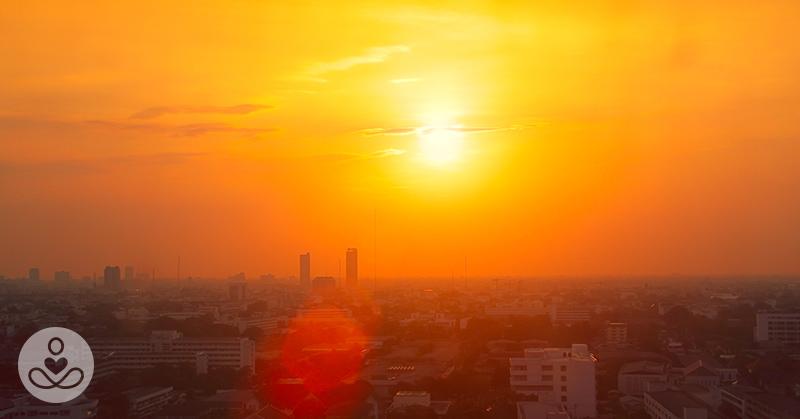Tom Matthews, lecturer in Climate Sciences in Loughborough University, is an avid researcher on climate change, more particularly, on the hazards from extreme weather and tropical cyclones. His research is frightening, but what’s more frightening is that messages about the dangers of extreme heat are not receiving the airtime it deserves. [1]
Matthews has been approached by multiple media outlets to discuss the UK heatwave and climate change in general, not about the global hazard this heat creates.
While the UK sweats from temperatures like 95°F (35°C) and France from 115°F (46°C), people are managing in drastically hotter climates. Earlier this summer, India reported a temperature of 122°F (50°C). In previous years, Pakistan and Kuwait reached 129°F(54°C). Although people in these areas are used to more extreme temperatures, heat at this level is still capable of killing. It can also lead to other fatal disasters, such as drought and rampant fires. [2]
For example, 2003’s disastrous heatwave claimed about 70,000 European lives [3]. In 2010’s summer, there were over 40,000 deaths in western Russia alone. From these cases, there are now plans and systems in place for warnings and health alerts in the case of these extreme temperatures.
However, there are some communities that are less fortunate and experience this extreme heat on regular places, such as South Asia and the Persian Gulf.
Although the human body has a built-in temperature regulation system, i.e. sweating, it does have a limit.
The Body’s Thermal Limit
When an environment is hot, the body uses the process of evaporation — by sweating — to keep its temperature at a safe level.
When the wet-bulb temperature hits or exceeds 35°C the body’s heat threshold is crossed, and the air is so full of water vapor, sweat is no longer able to evaporate. The wet-bulb temperature measures how much moisture is in the air, as opposed to the dry-bulb temperature is the usual temperature process used, which only measures heat, regardless of moisture.
When the body loses its cooling function, its core temperature rises no matter how much water is consumed, or how shaded the body is, or how rested it is. Without a respite to this high temperature, death can occur, more easily for the young, elderly, and those with pre-existing medical conditions.
A wet-bulb temperature of 35°C has not been reported often, but they may be starting to occur in Southwest Asia. However, climate change may cause more densely populated areas around the world to pass this threshold within the next hundred years, with the Persian Gulf, South Asia, and even the North China Plain in the lead. These places are populated by billions of people. [5]
Fortunately, in places like the UK, citizens can protect themselves from the heat by drinking more water, seeking shade, and air conditioning; however, the latter comes with the cost of extensive energy use. In 2050, cooling units are expected to demand triple the amount of energy used today.
“Growing electricity demand for air conditioning is one of the most critical blind spots in today’s energy debate,” says Dr. Fatih Birol, Executive Director of the IEA. “With rising incomes, air conditioner ownership will skyrocket, especially in the emerging world. While this will bring extra comfort and improve daily lives, it is essential that efficiency performance for ACs be prioritized. Standards for the bulk of these new ACs are much lower than where they should be.
“Setting higher efficiency standards for cooling is one of the easiest steps governments can take to reduce the need for new power plants, and allow them at the same time to cut emissions and reduce costs.” [6]
If these electric demands can be supplied, this will enable people to thrive in a future of a hotter climate. However, relying on power to create a healthy environment can be fatal during a time of a power outage.
In the Case of a Blackout…
Matthews investigated the possibility of this sort of event with a few colleagues.
Tropical cyclones have already caused widespread blackouts; for example, the power failure in Puerto Rico post-Hurricane Maria lasted for months. [7] Cyclones become more dangerous with high temperatures, and during such an emergency, providing clean drinking water becomes a top priority. [1]
How to Reduce Climate Change
However, it is not too late to limit or avoid the worst of climate change effects.
NASA recommends a two-tiered approach involving:
- “Mitigation,” which reduces the flow of greenhouse gases into the atmosphere
- “Adaptation,” which teaches people how to live with the climate changes already in motion
Climate change is a complex problem that affects people worldwide, so it requires a global response, such as international policies and international agreements to promote cleaner forms of energy. It also calls for action from cities and regions to upgrade public transportation systems, improve energy efficiency, and make plans for a cleaner and healthier environment. [8]
Sources
- T. Matthews, R. L. Wilby, and C. Murphy. An emerging tropical cyclone–deadly heat compound hazard. https://www.nature.com/articles/s41558-019-0525-6
- Herring, S. C., A. Hoell, M. P. Hoerling, J. P. Kossin, C. J. Schreck III, and P. A. Stott, Eds., 2016: Explaining Extreme Events of 2015 from a Climate Perspective. Bull. Amer. Meteor. Soc., 97 (12), S1–S145. https://journals.ametsoc.org/doi/pdf/10.1175/BAMS-D-16-0145.1
- Nikolaos Christidis, Gareth S. Jones, and Peter A. Stott. Dramatically increasing chance of extremely hot summers since the 2003 European heatwave https://www.nature.com/articles/nclimate2468 December 8, 2014
- Hanna EG, Tait PW. Limitations to Thermoregulation and Acclimatization Challenge Human Adaptation to Global Warming. https://www.ncbi.nlm.nih.gov/pubmed/26184272 July 15, 2015
- Eun-Soon Im, Jeremy S. Pal, and Elfatih A. B. Eltahir. Deadly heat waves projected in the densely populated agricultural regions of South Asia. https://advances.sciencemag.org/content/3/8/e1603322.full August 2, 2017
- Air conditioning use emerges as one of the key drivers of global electricity-demand growth https://www.iea.org/newsroom/news/2018/may/air-conditioning-use-emerges-as-one-of-the-key-drivers-of-global-electricity-dema.html May 15, 2018
- Trevor Houser and Peter Marsters. In a Class of its Own Within the US https://rhg.com/research/puerto-rico-hurricane-maria-worlds-second-largest-blackout/ April 12, 2018[8] NASA. Is it too late to prevent climate change?https://climate.nasa.gov/faq/16/is-it-too-late-to-prevent-climate-change/

